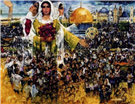To investigate the trials and tribulations of the phrase “Arab Spring” for English-language audiences since 2010, it may be useful to start with a Google search—or, rather, a quick history of Google search results. If one looks at the top results for English-language searches using the term “Arab Spring” from 2010-2012, here is what you get:
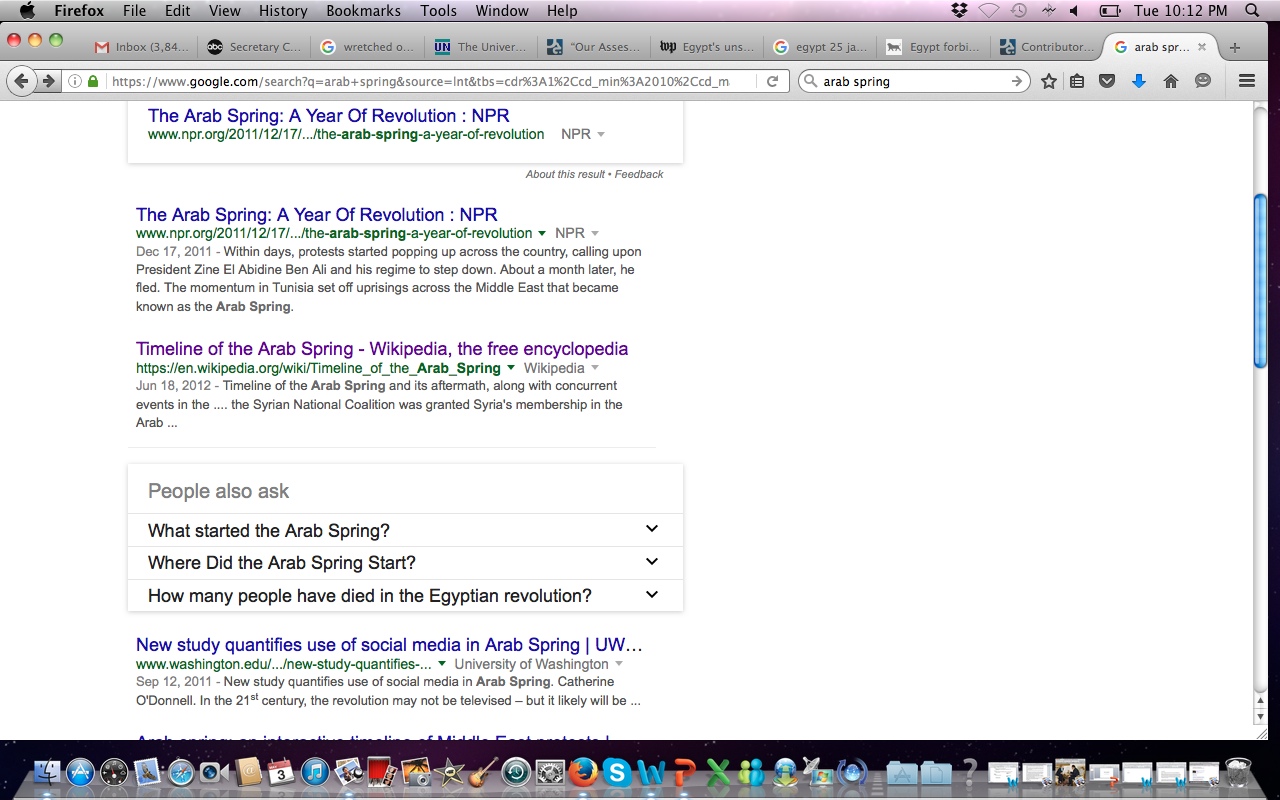
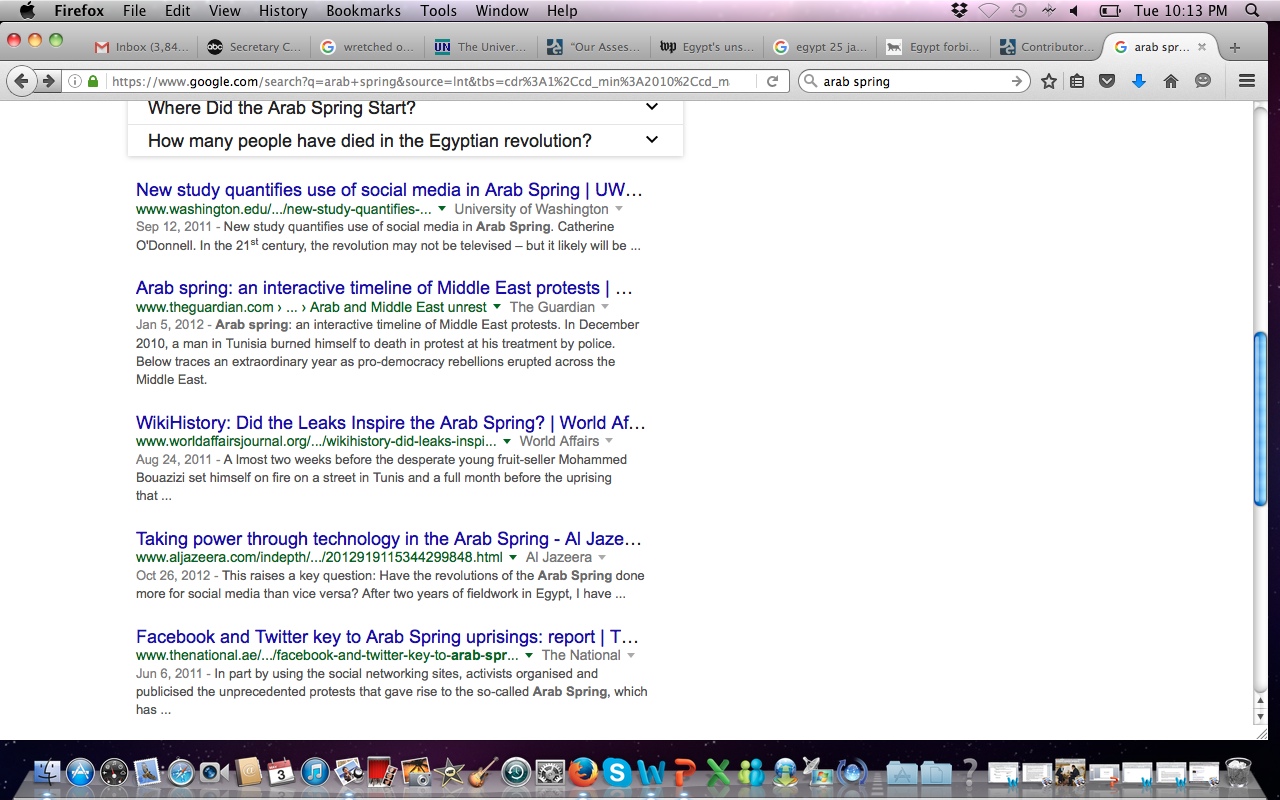
A few things jump out, foremost among them the celebratory tone, accompanied by the desire to locate and attribute the credit for this “year of revolution,” as National Public Radio, hardly a hotbed of revolutionary desires, dubbed it. Was it Wikileaks that started things rolling? Should Facebook or Twitter get the laurel? How long would it be before Mark Zuckerberg was handed his Nobel Peace Prize?
In a more serious vein, what should also be noted via this short exercise in time travel is the extent to which readers at this point in time wanted to understand the chronology and, to some extent, the genealogy of events related to the uprisings (thus the popularity of interactive timelines). It is worth remembering that this was also the moment when various iterations of Occupy movements had come to prominence in North America and Europe. These movements very directly declared that the Arab Spring was a guiding inspiration for their tactics and actions; indeed, the defining statement released by Occupy Wall Street at its inception declared the movement’s debt to what it understood as the “Arab Spring”: “We are using the revolutionary Arab Spring tactic to achieve our ends and encourage the use of nonviolence to maximize the safety of all participants.”
If these initial responses betrayed a lack of nuanced understanding of the full depth and complexities of the popular uprisings and revolutions throughout the region that had come to be known as the “Arab Spring,” they nevertheless suggested a hopeful sign: young English-language audiences were beginning to shed their stereotypical views of “the Middle East” and find in these popular movements a set of interlocutors and inspirations for their own struggles.
Moving ahead to the top Google searches for 2012-2014, one immediately notices the major shift that has begun to occur.
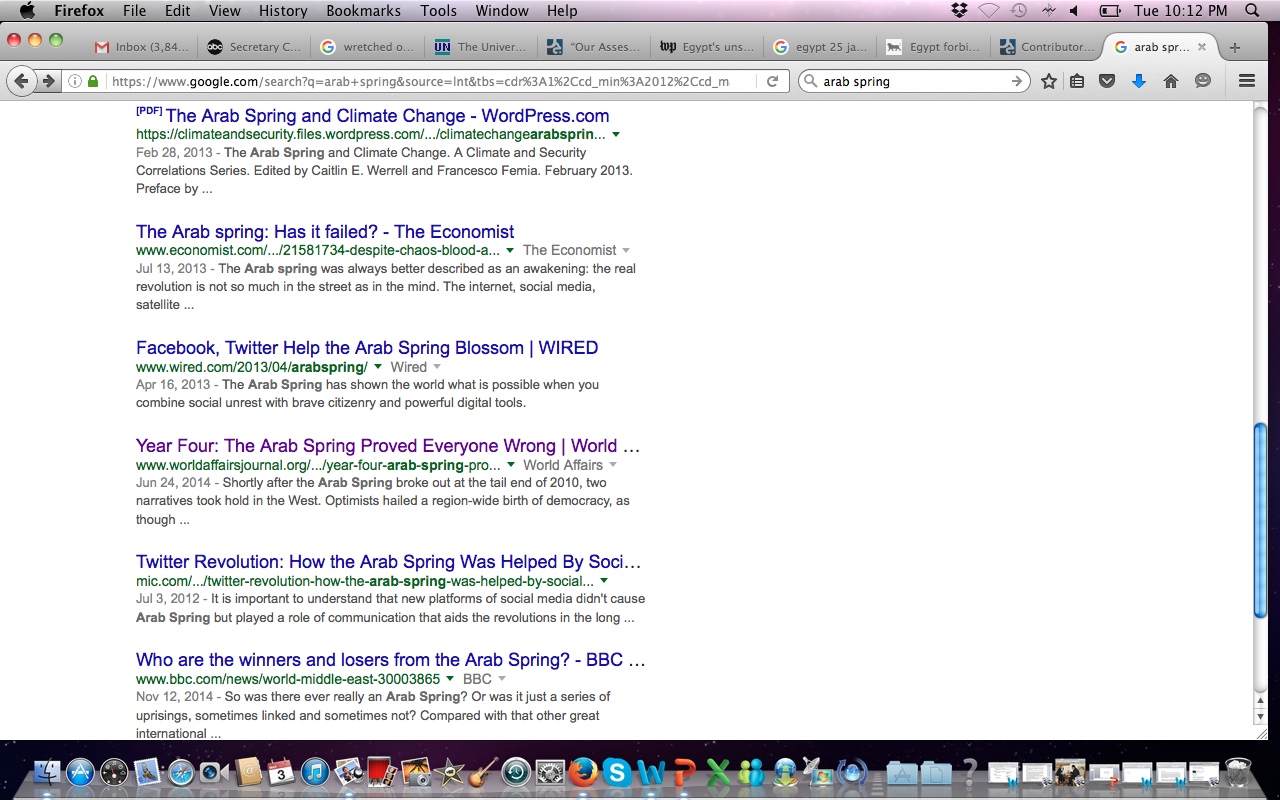
There are still attempts here to understand the roots of the uprisings, some quite serious (a study of the relationship between the Arab Spring and climate change), others still tied to the obsession with social media (“Twitter Revolution”; “Facebook, Twitter Help the Arab Spring Blossom”). But more significant in this phase is the suggestion that the time had come to identify what the final outcomes of the Arab Spring were. “Who Are the Winners and Losers from the Arab Spring?” asked the BBC; and, in a more negative mode, the Economist asked: “The Arab Spring: Has It Failed?” Beyond the idea of judging the success or failure of this thing called the “Arab Spring,” the most important thing to note here is the temporality of such articles. The Arab Spring, we were made to understand, was a thing that has happened; it is now, for purposes of analysis, over, and so the post-mortems can begin in earnest.
The most recent top Google searches confirm that “post-mortem” is the correct analogy here, at least for the dominant strand of English-language publications.
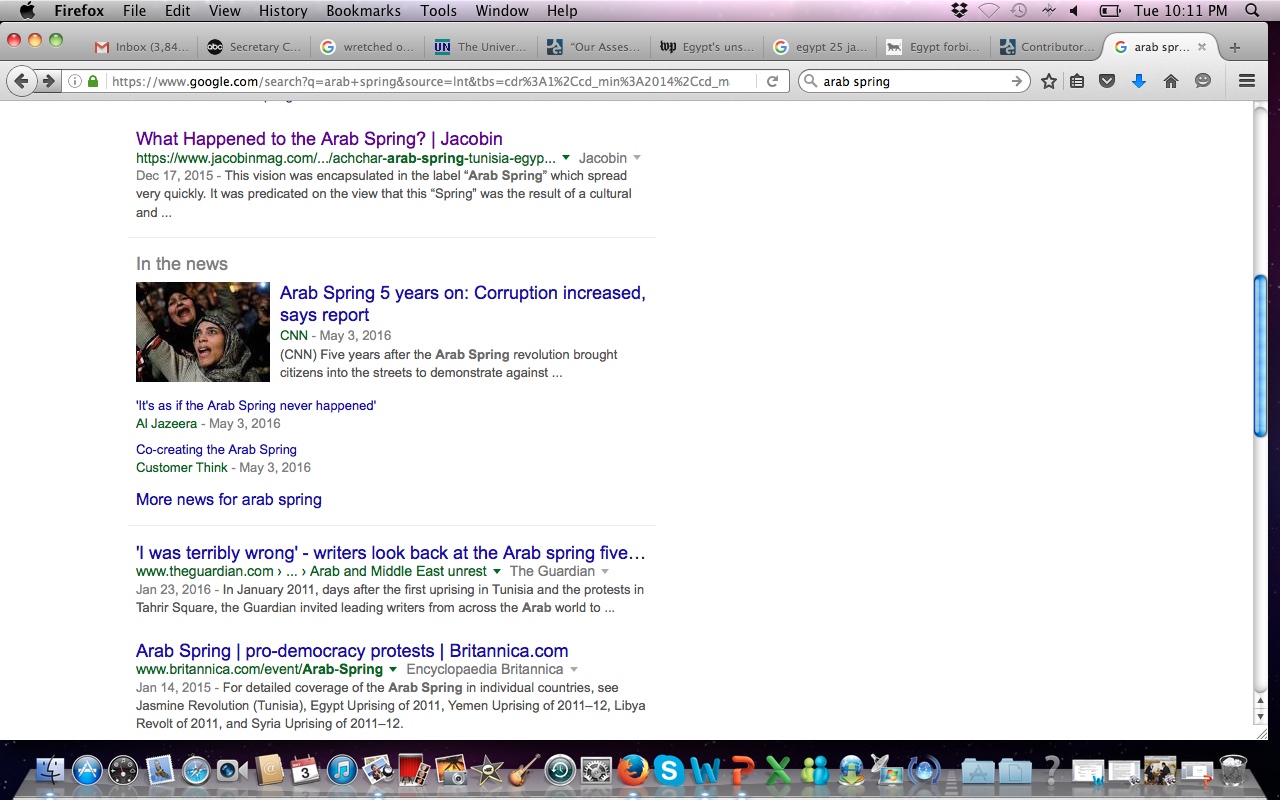
Some of the strongest voices came from the left end of the spectrum. “What Happened to the Arab Spring?” asked Jacobin. The Guardian’s most-read piece on the topic has the title: “‘I Was Terribly Wrong’: Writers Look Back at the Arab Spring Five Years Later.” From a more mainstream angle, CNN was more direct: “Arab Spring Five Years On: Corruption Increased, Says Report.” The Arab Spring, in this reading (which continues to color the views of many English-language audiences today) may have actually made things worse (says report).
It should be noted that the forces of commerce still, in spite of it all, want a piece of the action—CustomerThink, “a global online community of business leaders striving to create profitable customer-centric enterprises,” featured a report on the “Arab Spring” in May 2016 that focused on “value co-creation” and the transformation of “service systems,” with a view to how such knowledge could help “the business world”). But for the most part, the consensus appears to be that the “Arab Spring,” a thing that had happened once upon a time, had not, for the most part, turned out very well at all. Far from a site of inspiration and information for popular movements, it had been turned into a warning: be careful what you wish for.
Why worry at all about such online ephemera? Surely scholars and activists—particularly those who have themselves been involved in the uprisings—have produced far better accounts, many of them here on Jadaliyya? And surely those are the ones we should pay attention to, rather than getting caught up in the question of what got the most clicks among English speakers over the past six years?
Of course. But this battle over the meaning—or, better said, the appropriation and re-positioning—of this term “Arab Spring” nevertheless matters. It matters, first of all, for English-language audiences concerned with addressing their own governments’ role in the counter-revolutionary violence that has resounded since 2010. The role of the US and its allies—not to mention that of international financial institutions pushing the neoliberal line of structural adjustment—in unleashing counterrevolutionary violence in the region has not received nearly the attention it deserves to, nor has it been sufficiently resisted by the left in North American and Europe. This is one reason for the shocking and inexcusable silence, even among the left, regarding the continuing slaughter occurring daily in Yemen, for example. If this was all true for US-based audiences in 2010, it is even more so today, in the era of Trump’s travel and refugee ban and the more general administration policy, so well named by Zaid Jilani: “If we bombed you, we ban you.”
But the struggle over the meaning of the “Arab Spring” also matters for English-language audiences in terms of both solidarity and inspiration. From the viewpoint of solidarity, it needs to be said that, as against the idea that the “Arab Spring” is over, popular struggles in the region of course continue, and deserve our support. Early reactions to the Arab Spring, which suggested that the West’s Orientalist stereotypes might be in the process of being overthrown, have been effectively replaced by a simplified narrative by which those living in the region can be understood only through the lens of fear (“the terrorist”) or pity (“the refugee”). The battle against Orientalism, in other words, continues.
From the viewpoint of inspiration, it is important that both of the differently simplified versions of the “Arab Spring”—the first idea that it represented a brief, completely non-violent, telegenic, social-media-based revolution that achieved its ends in about the period of time necessary to binge-watch a TV series; and the second idea that the “Arab Spring” names a noble but misguided failure that has brought the region nothing but death, destruction, and ISIS—be once and for all destroyed.
To do so, we need to fight for a different framework for understanding revolutions in the moments of their unfolding. As Behrooz Ghamari-Tabrizi has recently and brilliantly argued in his book Foucault in Iran, our analytical struggle, in the case of the popular uprisings and revolutions such as those of the “Arab Spring,” is “to save the integrity of the revolutionary movement from its later outcomes.”[1]
To do so means insisting, once and for all, that the “Arab Spring,” as popularly understood, never actually happened; nor has it, once and for all, ended. Others who are taking part in this roundtable are better equipped to describe, with the necessary complexity and commitment, what did in fact happen. As for what happens next, that is, to a great extent, up to all of us.
NOTES
[1] Behrooz Ghamari-Tabrizi, Foucault in Iran: Islamic Revolution after the Enlightenment (Minneapolis: University of Minnesota Press, 2016), 75.
*******
[This article is one of six contributions to the Jadaliyya roundtable on Arab Uprisings. Click here to read the introduction or read other contributions].

